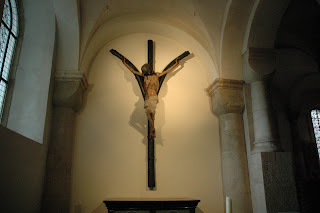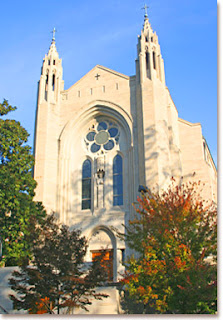Salvation Outside the Church
I read a good article over at CatholicCulture.com on the Church's teaching on salvation outside the Church. The article was describing correspondence between the author and a protestant, who was questioning Catholic teaching on whether a Muslin can be saved. My favorite quote was "...that the Church teaches that any person who, responding to the grace he has been given, seeks to know God and do His will (or if he has no opportunity to know God, at least seeks to know the good and to do it) may be saved". This approach to salvation was not acceptable to the protestant, primarily do to individual interpretation of scripture. The article goes on to discuss the necessity of the magisterium in guiding our interpretation of scripture.
The article provides a great road map on how to discuss this issue with people. You can find the article here.
The article provides a great road map on how to discuss this issue with people. You can find the article here.


The Church’s teaching on “extra ecclesia nulla salus [no salvation outside of the Church]” is complicated and susceptible to misunderstanding. It is so, first of all, because the topics this teaching necessarily entails (e.g., the nature of salvation, the nature of the Church, the nature and effects of the sacraments, and the sovereignty of God) are themselves difficult and complicated. Many have failed to recognize the true extent of the Church, the mystical body of Christ, (often by failing to recognize the true extent of the effects of the Church’s sacraments, especially the Eucharist) and have, consequently, erred in determining who is within and who is truly without the Church (extra ecclesiam). Others have failed to realize that, as the Catechism states, approving of Aquinas’ observation, “God has bound salvation to the sacrament[s]…but He Himself is not bound by the sacraments” (see Summa theologiae, III, q. 68, a. 2). They have, as a result, equated the ordinary means of salvation with the only means of salvation.
ReplyDeleteThe Church’s teaching on this subject is easily misunderstood, secondly, because the Church’s official declarations on this teaching have, until recently, been limited and specific, i.e., not addressing the topic fully. The Magisterium has usually made official declarations about the necessity of the Church for salvation in response to those who have belonged to and then rejected the Church or her doctrines (e.g., schismatics and heretics). The declarations contained in Unam sanctam and Cantate Domino are of this type. An examination of both the historical background of the documents and the context of the pertinent passages within the documents themselves reveals this fact. The Magisterium has always confirmed that it is necessary for members of these groups to be re-united to the Church to be saved. The Church has discussed this topic officially in a general way (i.e., with respect to every kind of person) only recently, e.g., in Mystici corporis, at the Second Vatican Council, and in the Catechism. It has affirmed in these general discussions that it is possible for those who are invincibly ignorant of the Gospel and, therefore, of the Church and yet seek the truth and voluntarily do the will of God as they understand it to be saved without being within the Church (see Lumen gentium, 16 and CCC, Para. 1260). Those who have failed to recognize the difference in subject or scope between these earlier and later declarations have erroneously perceived a conflict in the Church’s teaching on this topic.
Peregrinus,
ReplyDeleteI think a key point you make is that those "invincibly" ignorant of the Gospel may find salvation and that concept ,in of itself, is a very difficult issue to grasp. Some would argue that this is a very rare occurrence.
That is why preaching the truth to all people is important, whether they be Christian or not. Christ formed one Church on earth and it is through that Church that salvation, in the ordinary manner, is achieved.
Invincible ignorance can be defined in a general way, as the Catholic Encyclopedia explains, as ignorance one is unable to rid oneself of despite the employment of "moral diligence" (i.e., of trying every "obligatory and reasonably possible" means) of doing so. What constitutes "obligatory and reasonably possible" will, of course, vary somewhat depending upon the circumstances of the individual. I would agree that, in any case, this condition is relatively rare with respect to determining in this modern age the nature of the Church.
ReplyDeleteThe goal of human life, of course, is not merely to squeak through the gates of Heaven at the time of judgment. It is both to begin living in the Kingdom of God, albeit imperfectly, during one's mortal life through the sacraments of the Church and then to live fully the perfect happiness of Heaven in the after-life through union with God. This goal can only be achieved by those perfectly united with the Catholic Church in this life. The ordinary means of salvation is much more joyful and rewarding than the extra-ordinary means; and we should desire this means for every one and do what we can to make it available to them.